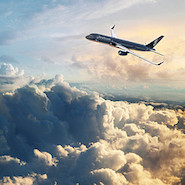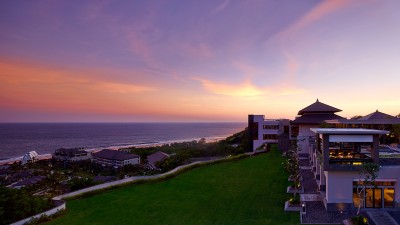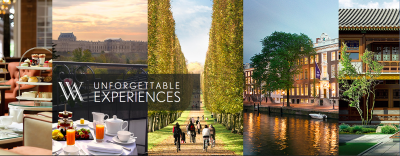 Four Seasons' private jet
Four Seasons' private jet
The Ritz-Carlton and Four Seasons are the most preferred hotel brands among earners in the 95th and 99th percentiles of United States households, according to a new report from Resonance.
The frequent trips and high expenditures of travelers whose income ranks them in the top 5 percent makes the market lucrative disproportionately to its size. However, the demographic data and consequently preferences of the small group are often out of step with travelers as a whole, meaning hoteliers need to remain sensitive to their desires even while catering to the next generation of high-earners.
“2016 U.S. Luxury Travel Report” surveyed 1,667 travelers in the top 5 percent of U.S. households and an additional 724 in the top percentile, weighing data according to age, gender and income against the U.S. Census and comparing it to travelers overall. The top 5 percent are defined as those with a household income of at least $200,000 or net worth of $2 million, while the top 1 percent thresholds were double those numbers.
"What we identified about the top 5% of travelers is that just because they are all wealthy, they are not all one in the same," said Chris Fair, president of Resonance. "We identified three specific types of wealthy travelers who travel for different reasons and seek out different types of activities and experiences while on vacation.
"To succeed in the future, luxury hotel brands need to decide which particular segment they are best suited to pursue and focus their offering and messaging in a way that will resonate with that particular target audience."
Flying high again
The wealthiest 5 percent of Americans average 14.3 trips per year and spent $3,115 per person per vacation, numbers that far surpass the American average and represent nearly $400 billion per year.
Such consumers are disproportionately married, 80 percent male and are split evenly between baby boomers and Gen Xers, with millennials accounting for a mere 8 percent. Comparing the top 5 percent to the top 1 percent, the latter averages about three more trips per year for a total of 17, nine of which are business trips.
More pertinently, those in the top 1 percent are marginally less likely to book a vacation on a travel Web site, preferring to use a travel agent or make a phone call with hotels, resorts and airlines. Although millennials are unlikely to pick up the phone to book a vacation, those in the travel and hospitality industry need to be aware that the largest spenders and most frequent travelers prefer to and should plan accordingly.
 Four Seasons Budapest on app
Interestingly, when planning a destination, the top 1 percent is more likely to be influenced by peer reviews than the average traveler. Twenty-nine percent of those surveyed rated the importance of online reviews and ratings as a 9 or a 10 on a numeric scale, compared to only 20 percent of total travelers. The same is true of friends and family recommendations.
The top 1 percent is also more concerned about cultural attractions, proximity to water and that the destination be accessible by commercial flight. On the other hand, the prevalence of the English language, the cost and whether the U.S. dollar is accepted are less important.
In overall brand opinion, Ritz-Carlton ranked highest among those in the top 5 percent, with a mean score of 8.6, the highest percentage of scores of at least an 8 at 82 percent, and tying for the highest percentage of 10 scores with Aman at 33 percent, edging out Four Seasons by 1 percent.
Four Seasons finished second, with Peninsula Hotels and Mandarin Oriental third and fourth in terms of percentage of 8s or higher, but behind Aman in average score.
Four Seasons Budapest on app
Interestingly, when planning a destination, the top 1 percent is more likely to be influenced by peer reviews than the average traveler. Twenty-nine percent of those surveyed rated the importance of online reviews and ratings as a 9 or a 10 on a numeric scale, compared to only 20 percent of total travelers. The same is true of friends and family recommendations.
The top 1 percent is also more concerned about cultural attractions, proximity to water and that the destination be accessible by commercial flight. On the other hand, the prevalence of the English language, the cost and whether the U.S. dollar is accepted are less important.
In overall brand opinion, Ritz-Carlton ranked highest among those in the top 5 percent, with a mean score of 8.6, the highest percentage of scores of at least an 8 at 82 percent, and tying for the highest percentage of 10 scores with Aman at 33 percent, edging out Four Seasons by 1 percent.
Four Seasons finished second, with Peninsula Hotels and Mandarin Oriental third and fourth in terms of percentage of 8s or higher, but behind Aman in average score.
 The Ritz-Carlton, Bali, Indonesia at sunset
Despite the scoring, however, when instead asked, “When choosing a hotel for a vacation, which brand would be your top three choices?” 15 percent of those in the top 5 percent of income ranked Marriott first, compared to Four Seasons at 14 percent, Hilton at 11 percent and Ritz-Carlton at 8 percent. The difference compared to numerical score likely reflects price concerns.
Indeed, those in the top 1 percent chose Ritz-Carlton at higher rates, and 18 percent ranked Four Seasons first while an additional 23 percent rank it in the top three. Among those in the top 5 percent, St. Regis was a top three brand for 11 percent of consumers, Fairmont for 10 percent, Waldorf-Astoria for 9 percent, Mandarin Oriental for 8 percent and Peninsula for 6 percent, with numbers slightly higher for each among the top 1 percent.
Experience travel
Most revealingly, a whopping 69 percent of one-percenters say that participating in a “once-in-a-lifetime” activity is something they would like to do regularly on vacations, significantly higher than any other group. The move to experiential luxury has been well documented, but this data suggests that hotels that offer such opportunities at each of their destinations will likely get a large chunk of the lucrative spenders.
The Ritz-Carlton, Bali, Indonesia at sunset
Despite the scoring, however, when instead asked, “When choosing a hotel for a vacation, which brand would be your top three choices?” 15 percent of those in the top 5 percent of income ranked Marriott first, compared to Four Seasons at 14 percent, Hilton at 11 percent and Ritz-Carlton at 8 percent. The difference compared to numerical score likely reflects price concerns.
Indeed, those in the top 1 percent chose Ritz-Carlton at higher rates, and 18 percent ranked Four Seasons first while an additional 23 percent rank it in the top three. Among those in the top 5 percent, St. Regis was a top three brand for 11 percent of consumers, Fairmont for 10 percent, Waldorf-Astoria for 9 percent, Mandarin Oriental for 8 percent and Peninsula for 6 percent, with numbers slightly higher for each among the top 1 percent.
Experience travel
Most revealingly, a whopping 69 percent of one-percenters say that participating in a “once-in-a-lifetime” activity is something they would like to do regularly on vacations, significantly higher than any other group. The move to experiential luxury has been well documented, but this data suggests that hotels that offer such opportunities at each of their destinations will likely get a large chunk of the lucrative spenders.
 Waldorf Astoria Unforgettable Experiences
Many hotel chains are embracing the potential that experiential luxury offers in the hospitality sector.
While Four Seasons has been offering destination-specific experiences since 2014 (see story), perhaps contributing to its high rating, last September, Waldorf Astoria Hotels & Resorts offered an Unforgettable Experience at each of its 25 locations worldwide.
In addition to activities and engagements unique to each locale, Waldorf Astoria pushed its “True Waldorf Service” commitment, suggesting that unforgettable experiences start with the brand and extend beyond the packages. The offer aimed to compete with similar deals from its peers, establishing consumer loyalty and reinforcing the brand’s commitment to great service and experiences (see story).
Much of the conversation in the hospitality region revolves around attracting millennials, who will soon be the biggest luxury consumer. However, while the digital natives are less brand-loyal than their parents and grandparents, the disproportionate amount of money available in a much smaller demographic is a reminder that hoteliers must cast a wide net.
With baby boomers aging out of luxury consumption and millennials only now entering the market, brands need to find creative ways to engage both generations, according to a panel at the Luxury Retail Summit: Holiday Focus 2015.
The concept of “luxury” is alive and well, particularly among boomers who continue to associate it with value, quality and customer service, but with millennials looking for more experiential offerings and showcases of values, events and indications of culture are also becoming increasingly important. Still, despite apparently separate values and interests, it is important to remember that millennials are often the children of baby boomers, meaning that these generations are closer than they initially appear and that there are ways, such as family-oriented events, to appeal to both markets simultaneously rather than treating them as entirely separate entities (see story).
Waldorf Astoria Unforgettable Experiences
Many hotel chains are embracing the potential that experiential luxury offers in the hospitality sector.
While Four Seasons has been offering destination-specific experiences since 2014 (see story), perhaps contributing to its high rating, last September, Waldorf Astoria Hotels & Resorts offered an Unforgettable Experience at each of its 25 locations worldwide.
In addition to activities and engagements unique to each locale, Waldorf Astoria pushed its “True Waldorf Service” commitment, suggesting that unforgettable experiences start with the brand and extend beyond the packages. The offer aimed to compete with similar deals from its peers, establishing consumer loyalty and reinforcing the brand’s commitment to great service and experiences (see story).
Much of the conversation in the hospitality region revolves around attracting millennials, who will soon be the biggest luxury consumer. However, while the digital natives are less brand-loyal than their parents and grandparents, the disproportionate amount of money available in a much smaller demographic is a reminder that hoteliers must cast a wide net.
With baby boomers aging out of luxury consumption and millennials only now entering the market, brands need to find creative ways to engage both generations, according to a panel at the Luxury Retail Summit: Holiday Focus 2015.
The concept of “luxury” is alive and well, particularly among boomers who continue to associate it with value, quality and customer service, but with millennials looking for more experiential offerings and showcases of values, events and indications of culture are also becoming increasingly important. Still, despite apparently separate values and interests, it is important to remember that millennials are often the children of baby boomers, meaning that these generations are closer than they initially appear and that there are ways, such as family-oriented events, to appeal to both markets simultaneously rather than treating them as entirely separate entities (see story).
"Wealthy and young travelers actually have more in common than one might think as the top two criteria in choosing accommodation for the Top 1% and Millennials are exactly the same - free internet access and privacy," Mr. Fair said. "Where they differ is primarily in their demand for services such as a hotel restaurant, fitness centre and concierge service, which is much more important to wealthy travelers.
"But as younger travelers mature, I expect that we'll see demand for more services, as according to our research a full service hotel/resort is already the preferred type of accommodation among milllennial travelers if price is not considered," he said. "While the trend has been towards the development of increasingly limited service offerings, I think the greatest opportunity for hotels is to find a new balance between limited and full service - delivering just what the wealthy require and those services that the Millennials aspire to have."
